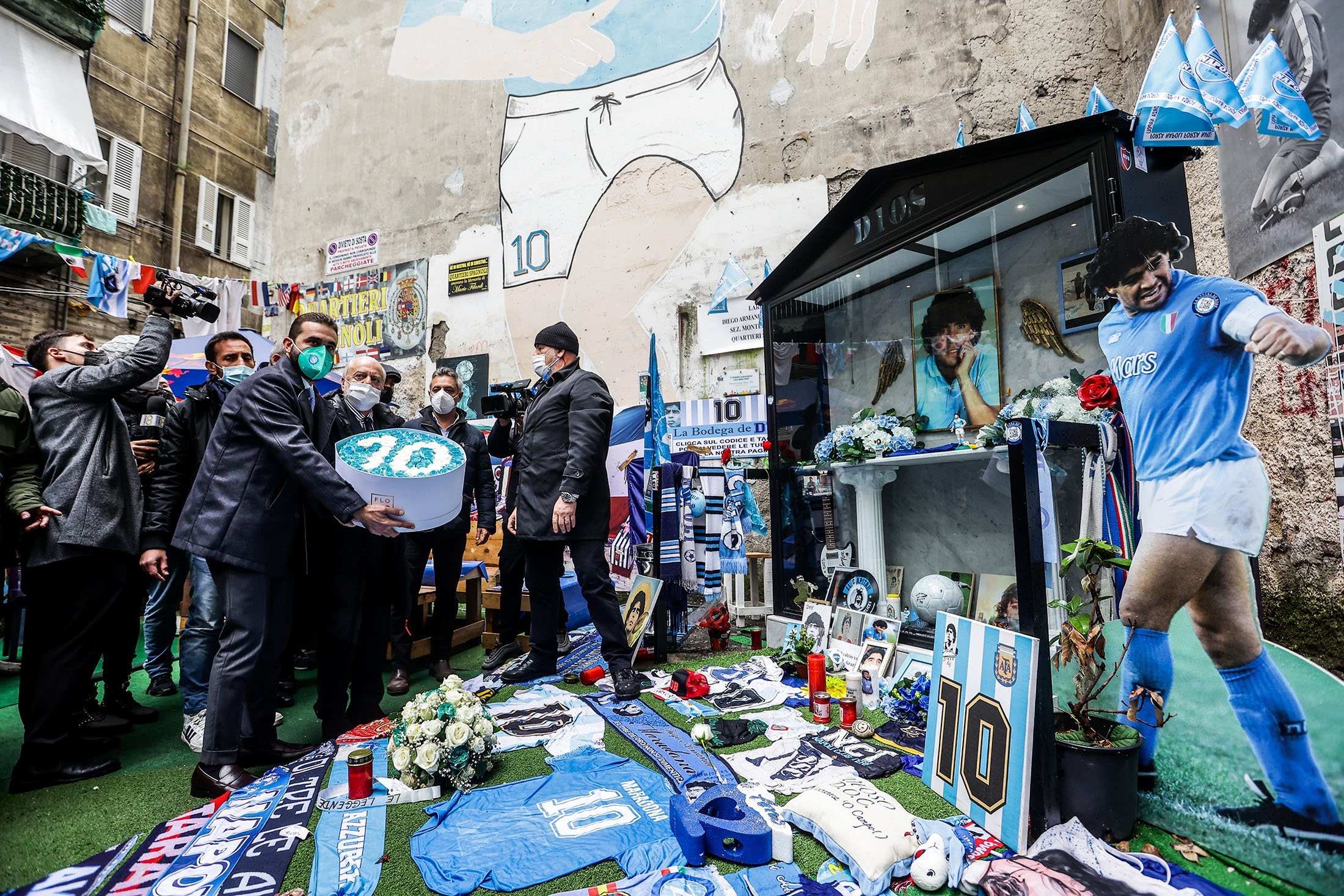© Turkuvaz Haberleşme ve Yayıncılık 2026
Under the shadow of the nearby Mount Vesuvius and overlooking a beautiful Mediterranean shoreline, Naples is known for its many patron saints throughout its history all believed to have been protecting the southern Italian city against the eruptions like the one that decimated Pompeii nigh on two millennia ago. However, maybe the most bizarre addition to these saints has been the latest as Neapolitans revere the late Argentinian footballing legend Diego Maradona to the degree of sainthood.
Like most of the residents of Naples, taxi driver Gianmarco has a picture of the city's patron saint, San Gennaro, stuck to his car windscreen.
"Without his protection, our lives would be almost unimaginable," he said, steering the vehicle along the seafront, from where you have a magnificent view of the hilly Italian city, its castles and the deep blue Gulf of Naples.
Neapolitans venerate their city's patron saint, who died as a martyr in 305 A.D. San Gennaro is believed to have answered people's prayers in 1631, halting the eruption of Mount Vesuvius and saving Naples from destruction.
"The city's proximity to Vesuvius means Naples' inhabitants have always felt a saint who can protect them from the volcano's fury is essential for their survival," said historian Gianni Russo.
Faith and superstition are closely intertwined in the southern Italian city.
Russo shows off a cornicello fixed to his keyring, a little red horn that he said will protect him from the evil eye.
Deeply Catholic Neapolitans have always had many patron saints. However, San Gennaro now has some serious competition from abroad, in the footballing form of Diego Maradona who, Neapolitans say, has helped the city get rid of its inferiority complex toward the north.

Since his death in 2020 at the age of 60, the legendary Argentinian footballer has virtually become a new city saint, thanks to the fact that he led SSC Napoli to the Italian championship twice.
Exploring Naples, you see Maradona's likeness everywhere, emblazoned on walls, lanterns and doors of almost every street.
In the tradition-steeped Via San Gregorio Armeno in the heart of the old part of Naples, you can buy figures of the footballer in all possible sizes, frequently adorned with the wings of an angel.
"Nobody combines the sacred and the profane as easily as we Neapolitans do," said Russo jokingly. "Naples and Maradona, it's a special kind of love story."
Not far away is bar Nilo, which takes the cult of Maradona to a new level, with an exhibition of real hair from the Argentinian footballer's head, kept behind protective glass.
Bar owner Bruno Alcidi is said to have sat behind Maradona on a plane following an away game in Milan. On the headrest in front of him, he allegedly discovered a small tuft of his idol's hair. He took it with him and stored it safely in a cigarette box.
Back in Naples, Alcidi created his own private shrine with the "capello miracoloso die Maradona," the footballer's miraculous hair, displayed alongside photos and a statue of the Virgin Mary.
Near Alcidi's bar, Maradona fans will find another pilgrimage site, though it involves a steep walk up some very narrow alleyways in the Quartieri Spagnoli.
Opposite the Bodega de Dios pub is a modern open-air Maradona temple, crowned by a huge mural of the star. Fans gather here every evening.
Meanwhile, in the square opposite the pub, you can find jerseys and other devotional objects. Susi Bostik, the daughter of the pub owner, is proud of the football star: "He has given our city and the poor south of Italy back their dignity. Since Maradona, we no longer have inferiority complexes toward the north."
Maradona has brought local changes too. "In the past, no one from outside ever dared to come up here, but now our neighborhood is safe," Bostik said.
Close by on Piazzetta Parrocchiella, there is a huge and garish turquoise mural that pays homage to Ugo Russo, a boy who was killed by police at the age of 15 when he pulled out a plastic gun during a robbery.
The painting is soon to disappear, a fact that angers Susi Bostik and her friends.
They can only draw consolation from the fact that "we have our idol, namely Diego Maradona," said the Neapolitan.
